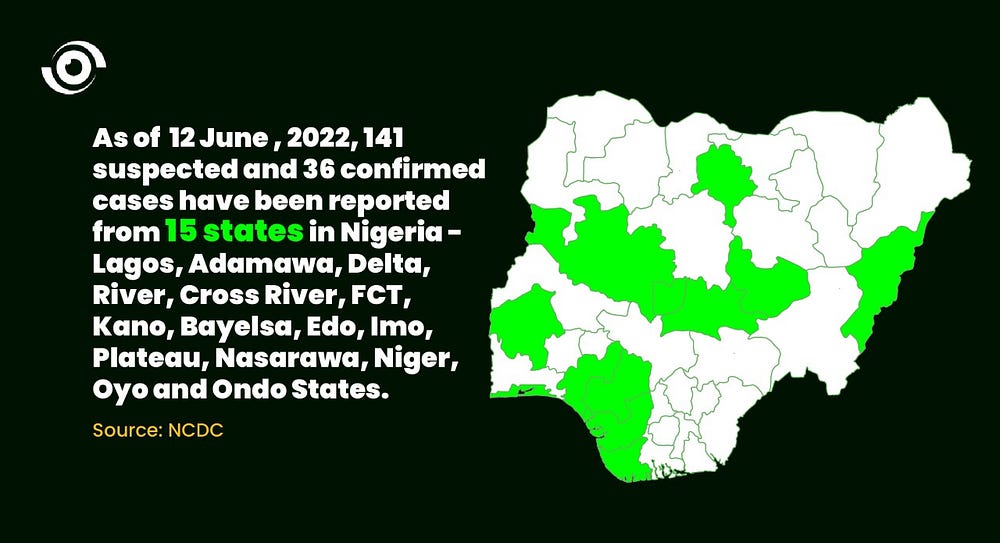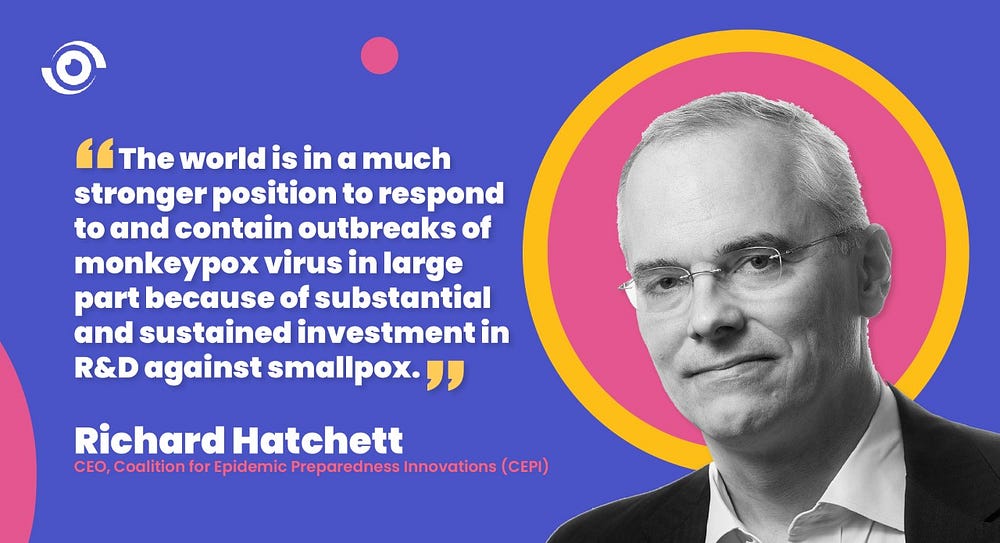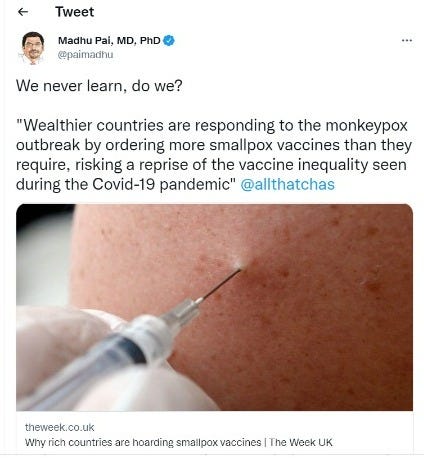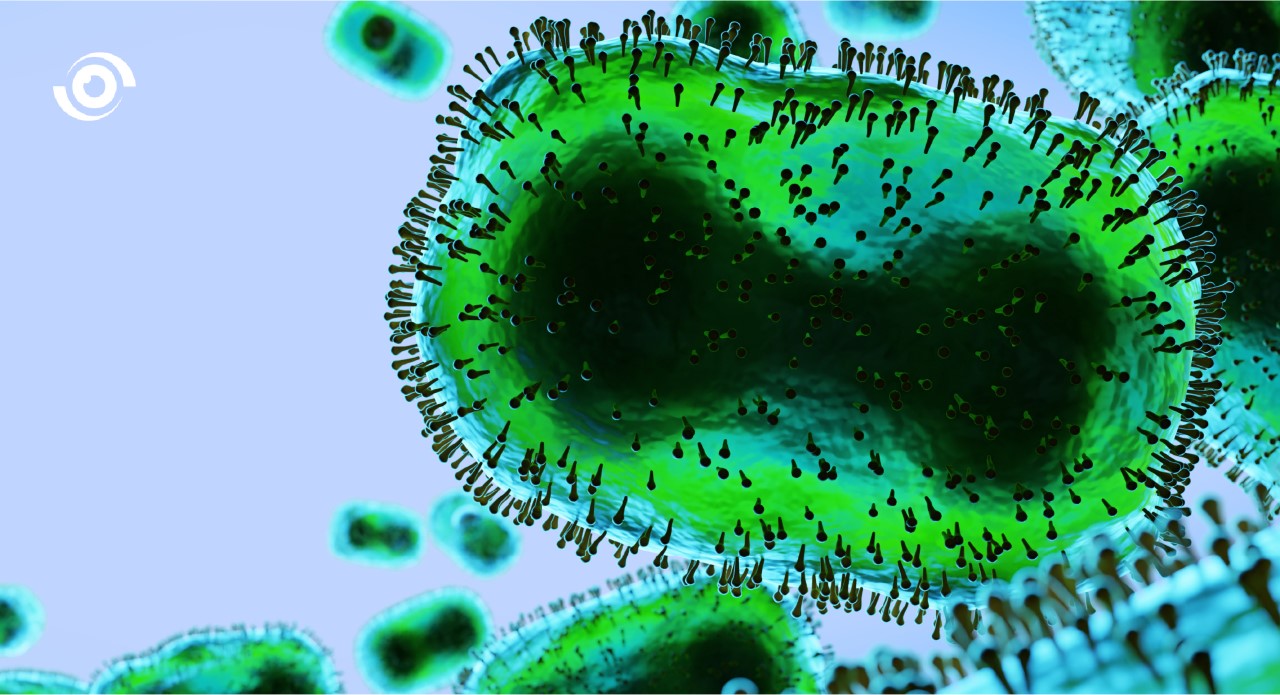The current epidemiology and spread of monkeypox
The spread of monkeypox to apparently non-endemic countries has highlighted again the inequity in the global response to the infectious disease outbreak. Monkeypox is considered “endemic” in a few countries in Central and West Africa, including Nigeria where the disease re-emerged in 2017 after about 39 years and has since been reported annually. However, cases have recently been reported in states that have previously not reported any cases, as well as in countries in West Africa that have previously not reported cases. The spread of cases to new countries in Africa, deserves as much attention as the spread of cases in “non-endemic” countries.
However, the recent spread of monkeypox to countries in Europe, America, Eastern Mediterranean, and Western Pacific Regions was described as “unexpected”. Between 1 January and 15 June 2022, 2,103 laboratory confirmed cases, one probable case, and one death have been reported to WHO from 42 countries in five WHO Regions. The World Health Organization (WHO) is convening an emergency meeting on the 23rd of June, to assess whether this unusual spread constitutes a public health emergency of international concern.

In Nigeria, 141 suspected and 36 confirmed cases have been reported in 2022, with the majority in Rivers, Bayelsa, Lagos and Delta States. The testing capacity in Nigeria has remained limited, with the Nigeria Centre for Disease Control (NCDC) National Reference Laboratory being the only facility in the country with the capacity to diagnose monkeypox cases. The logistics of getting samples from around the country to Abuja for testing, is incredibly challenging and it is likely that there are many more cases in Nigeria that are going undetected. The same may be the case in other African countries that have even less diagnostic capacity.

What many people may not know is that those that are old enough to have received a vaccine against smallpox, are also protected from monkeypox as these two viruses are very closely related to each other. As a child, I often wondered about the scar on my father’s arm — a mark of his vaccination against smallpox. With the eradication of smallpox in 1980, the need for smallpox vaccination became redundant and was stopped around the world. The eradication of smallpox is strongly attributed to an effective vaccine, a strong strategy and enabled by public health measures that included low-tech strategies.
Have vaccines for monkeypox always been in existence?
Like smallpox, monkeypox is caused by viruses that belong to the genus of Orthopoxvirus. Scientists have conducted research studies that found the vaccines licensed to prevent smallpox are about 85% effective in preventing monkeypox, when properly administered. Previous investment in research & development (R&D) against smallpox has meant that the world is better placed in having an available vaccine for monkeypox.

A newer vaccine called MVA-BN (Modified Vaccinia Ankara — Bavarian Nordic) was approved by the WHO for the prevention of monkeypox in 2019. This is the only vaccine licensed by a stringent regulatory authority (SRA) for the prevention of monkeypox in adults.
The global inequity in access to vaccines, therapeutics and diagnostics is being witnessed again with high-income countries stockpiling and administering vaccines against monkeypox within weeks of confirmation of the disease. WHO does not recommend mass vaccination against monkeypox, however the vaccine is recommended for contact of cases, health workers at risk, laboratory personnel performing diagnostic testing or research for monkeypox, and others who may be at risk as defined by individual countries. Therefore, as negotiations for vaccine supply begin, there must be accompanying efforts to raise demand among the target population most at risk.
The United States (US) has begun to offer the vaccines to contacts of cases. In the United Kingdom (UK), the vaccine is offered to contacts of cases and as a preventive measure to health care workers in high risk settings. France, Germany, and Denmark are examples of countries that have begun to place orders for monkeypox vaccines. No African country has to date begun any vaccination campaign against monkeypox.

Potential challenges with administering monkeypox vaccines in Nigeria
There are several lessons to be learned from Nigeria’s most recent population-wide vaccination exercise. Despite efforts by the Nigerian government to ensure the availability and accessibility of COVID-19 vaccines, the coverage level in the country remains immensely low. As at 5 June 2022, only about 12% of the eligible population in Nigeria has received at least one dose of the COVID-19 vaccine and 7.5% have been fully vaccinated. In comparison, 18% and 20% of the eligible population are fully vaccinated in Ethiopia and Ghana respectively, and 73% in the UK.
While this low coverage might be attributed to the global inequity in vaccine supply, there has been non-acceptance of the vaccine across the country. Various studies have also found a high level of hesitancy among health care workers, however challenges in the vaccine supply chain have also confounded access to COVID-19 vaccines, especially in hard to reach areas. This could be a potential challenge if Nigeria begins to offer the monkeypox vaccine to health care workers as is recommended. However, the potential stigma and discrimination they may face, as the pustules resulting from a monkeypox infection often forms visible scabs that leaves scars, may be an added impetus encouraging vaccine uptake.
Vaccine administration in Nigeria is often constrained by a limited supply of medically trained personnel, consumables, such as syringes and needles to administer the vaccines, as well as a reliable cold-chain maintenance, especially in rural areas. Given the pressure on existing capacity in-country for COVID-19 vaccination and other routine immunisation exercises, logistics and human resource for health (HRH) challenges could be an issue for future monkeypox immunisation exercises and could lead to gaps in access for target populations.
Preparing for monkeypox vaccine use in Nigeria
While the Nigerian health authorities have not announced any decision to offer or use monkeypox vaccines as a preventive measure, it is important that the country is proactive in addressing the known risks and preparing for the life-saving vaccines. So how do we ensure there is an effective vaccine rollout?
Firstly, there will be a need to ascertain the current interest and demand for monkeypox vaccines among potential target populations, as well as factors associated with acceptance or non-acceptance. This can be done by carrying out a research study among the target populations.
Secondly, it is important that measures are taken to protect the health of stigmatised and vulnerable populations, including people living with disabilities and other populations. Health care workers should be well-trained to provide a safe space for all people regardless of their sexuality or disability.
Thirdly, given previous misinformation about the monkeypox virus, and rumours that are being spread, it is important that the government prioritises proactive and reactive risk communications. The National Primary Health Care Development Agency (NPHCDA), National Orientation Agency (NOA) and other government and non-governmental institutions should develop communication strategies that ensure a flow of information between the government and the people, and vice-versa.
Finally, there is no doubt that in the current context, access to vaccines that prevent monkeypox can protect our health care workers and an already stretched health system, prevent further spread of the disease and protect our health security. The time is now to start preparing the target population for access to vaccines, while negotiating for vaccine supplies.



Thank you very much for your write-up on Monkeypox in Nigeria: Is there a case for vaccines?
First I think the title should be Monkeypox in Nigeria: Is there a case for VACCINATION?
Second, regarding your statement …”The testing capacity in Nigeria has remained limited, with the Nigeria Centre for Disease Control (NCDC) National Reference Laboratory being the only facility in the country with the capacity to diagnose monkeypox cases” I disagree with the statement. There are at least two or three other labs in Nigeria with sequencing capacity which we used for COVID-19 diagnosis and sequencing, that we could have added to the list of labs for monkeypox diagnosis. I am talking about the labs in NIMR and ACEGID Ede. We should have taken the availability of these labs to expand our testing capacity for monkeypox. We had on several occasions called for the establishment of a national network of sequencing laboratories COORDINATED, but NOT CONTROLLED by NCDC. I think, failure to establish this network, LIMITS our national testing capacity. We are not fully utilizing the expertise and facilities we have. To these other two labs, you may explore other labs in Kano and Sokoto.
Third on vaccines, or rather vaccination…….perhaps we could get vaccines for limited (preventive) use for front-line health workers and contacts of cases.
Fourth, instead of whining and weeping about equity and racism, our focus should be on organizing a well-coordinated ONE HEALTH national study to ascertain the reservoir/host of the monkeypox virus. We do not need to get a World Bank loan to carry out such a study. A well-written proposal should be a funding priority for the Ministries of Health, Agriculture, Science Technology and Innovation and TETFUND. The successful outcome will move us from being a CONSUMER of the research products of other people’s investments (for example, vaccines) to a CONTRIBUTOR of knowledge and a better understanding of the epidemiology and control of the disease.
Finally, a word on renaming viruses. Until recently, viruses or the diseases they cause were named after the first reported location of the virus. That is why we have German measles, Spanish Flu, Argentina Hemorrhagic Virus, Bolivian Hemorrhagic Virus, Venezuelan Equine Encephalitis, Marburg Virus, Lagos Bat Virus, Lassa fever virus, Mokola, Shamonda, Sango, Ilesha, Zika, West Nile, etc. Of course, people complained and virologists in recent years have moved away from naming viruses after locations. The African and Congo clades of monkeypox virus were named about the 1970s and 1980s. Indeed, if I were a monkey, I will most vehemently call for a change of name. Poor monkeys, the first monkeys that got the pox disease were imported from Asia (Singapore) to a lab in europe (Copenhagen) in the 1950s, where they got the pox, possibly from laboratory animals in the Copenhagen lab. While I support the renaming of viruses, the question is how far back do we go? Certainly, the people of Lassa would love a change of name, and so would the Germans, the Spaniards, the Bolivians, and the people of Marburg City. We cannot forget the early days of HIV/AIDS and the claim that it originated in Africa. We fought vigorously for a change, while we failed to deal with the devastation of the disease in AFRICA, While the rest of the world focused on getting the cure and finding ways of preventing the spread, we focused on name-calling, while the disease fingered millions of names among us. My point, the time has come for us to focus on the essentials and tangibles, time to concentrate on changing our name from one CC- Consumer Continent to a new CC- Contributing Continent. (I am not talking about contributing raw materials or our talents that end up in the diaspora). You know all these wasted efforts of weeping and whining about inequity…EQUITY cannot be won on our knees, winning equity is by force of action, not the passivity of pleading and appealing to conscience. You do not PRAY for equity, you WORK for it. Let me leave you with covid-19 and India. Remember when the UK placed Nigeria and other countries using the covi-shield vaccine made in India in the RED zone, and those using covid-vaxzevria made in europe in the GREEN zone. Nigeria and other African countries went on their knees, and like a broken record singing the song, with the lyrics of inequity, racism, and unfair treatment. India called the UK… you have covid-vaxzevria and we have covi-shield. If you do not take our covi-shield, we will not take your covid- vaxzevria. The UK capitulated with immediate effect, and the red turned to green…and Nigeria was able to ride the Mumbai train to London. That is how you fight and overcome inequity…..contributing, not consuming. India in 1947, and many years after its independence, was a beggar and consuming nation. Today………..
Oyewale TOMORI
Tel: +234 803 499 6524
Well said, Mr. TOMORI.
I really appreciate the response of the erudite professor of virology. I am in full support of Prof. Tomori, our government and private individuals should rise up and support R and D in this country. We need more laboratories to be coordinated by NCDC, not to have the Abuja office as the only focal point for Nigeria. Nigerian population is increasing everyday and we need to match up with this growth rated.